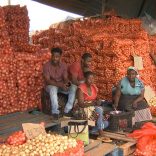Solenta Aviation Mozambique: Scheduled air operations
CTA denies that companies expect government’s “handouts on platters” – Carta

Photo: CTA on Facebook
“Companies do not expect ‘handouts on platters'” from the government, President of the Confederation of Economic Associations (CTA), Agostinho Vuma said this Monday (19) in a reference that can be interpreted as an indirect response to the criticism voiced a few days ago by President of the Republic, Filipe Nyusi.
Speaking at the opening of the first national conference on micro, small and medium enterprises earlier this month, President Nyusi said that businesspeople must not let themselves be dependent on short-term support such as subsidies or protectionist surcharges.
This Monday, the CTA found, in the Economic Seminar on Industrialisation, opened by Prime Minister Carlos Agostinho do Rosário, the occasion to indirectly respond to the president’s criticism of businesspeople.
CTA president Vuma denied that Mozambican companies wanted everything handed to them on “a platter”. What was needed, in the opinion of the corporation, were clear policies to help make industry viable, such as ensuring markets key to industrial development.
“Here, we are all challenged to do differently, something we haven’t done yet. And it is here that the CTA proposes to introduce a new approach to industrialisation that is essentially based on the promotion of local content, through state purchases. Here, it is assumed that the state is a ‘mega-project’, since the size of its expenditure currently corresponds to around 33% of the GDP, and has previously reached about 38%, which triggers the need for the definition of an acquisitions policy which favours and encourages adding value to products at local level, reinforcing existing policies,” the president of the CTA explained.
According to Vuma, the necessary incentive could be achieved through the “budgetary commitment of the Government of Mozambique to acquiring goods and services produced locally, with the use of local production factors [inputs]”.
The CTA recognises, however, that the government already prefers national companies in the public procurement process for the supply of some goods and services, as well as promoting the incorporation of national factors in relation to the supply of goods.
What the association now proposes, Vuma explained, was the incorporation of national factors in relation to the supply of goods, in order to encourage the manufacturing industry.
To materialise this approach, the CTA, in partnership with the Ministry of Industry and Commerce and other players, intends to map and identify potential locally produced goods, with a description of the respective production capacities and average prices, and identify the needs of the state in terms of the acquisition of goods, which will help to understand the existing production potential in the local market.
The CTA also intends to help domestic industry to identify the standards required by the state and the harmonisation of local goods, which will help ensure that the state makes a commitment to purchase locally produced goods, in a gradual way, proportional to existing capacity, accompanied by a concrete plan indicating the goals to be achieved.
Addressing the prime minister, businesspeople and other personalities present, the CTA president ended his speech by pointing out that the pandemic could be a great opportunity to promote industrialisation and domestic consumption, since, when it broke out, national industry responded, identifying needs and today producing masks, disinfectant alcohol-gel, and other Covid-19-related products.
“What we want is for this approach to be part of a policy in which domestic production is seen, within the standards, as a priority. And we emphasise: it will be a utopia, making the manufacturing industry grow, without incentives, and without protection in relation to the giants outside the doors,” Vuma concluded.
By Evaristo Chilingue













Leave a Reply
Be the First to Comment!
You must be logged in to post a comment.
You must be logged in to post a comment.